Working Papers
For submission of articles or Working Papers to CEsA, please send an email to:
comunicacao@cesa.iseg.ulisboa.pt
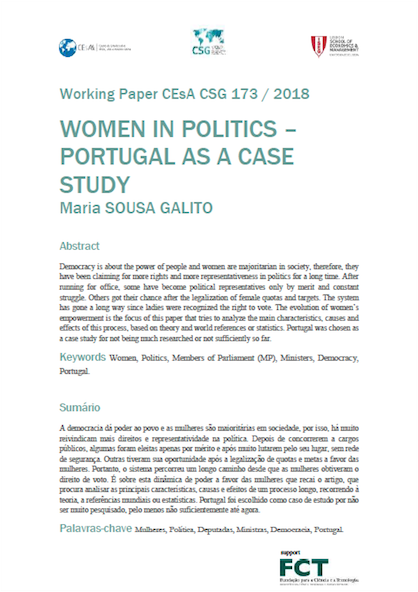
Working Paper 173/2018: Women in Politics: Portugal as a case study
Abstract:
Democracy is about the power of the people. In order to sustain, implies (at least) representativeness of its major groups. When majority rules minorities, lobbies complain when not happy and some of their demands are met; but the system doesn’t turn totally in their favor if it goes against the interests of a larger assembly. When minority rules the majority, problems arise (populism against elite, for instance); and sooner or later there’s a significant shift in society. Quantity gives power. Numbers do count in Democracy. Women are the majority of the population. It was not always so, but nowadays it’s an unquestionable fact. For cultural, institutional or socioeconomic reasons they were submissive for centuries to a system that did not recognize their public activity. They were not involved in decision making and rebel against that. At first, their demands were not met. But waves are changing. As long as democracy prevails and women’s numbers and percentages won’t drop, they’ll probably continue to raise awareness to their cause, increasing their power and influence in society. The evolution of women’s empowerment is the focus of Women in Politics: Portugal as a case study, that tries to analyze the main characteristics, causes and effects of this process, based on theory and world references or statistics. Portugal was chosen as a case study for not being much researched or not sufficiently so far.
Quotation:
Galito, Maria Sousa (2018). “Women in politics : Portugal as a case study”. Instituto Superior de Economia e Gestão – CEsA/ CSG – Documentos de Trabalho nº 173/2018.
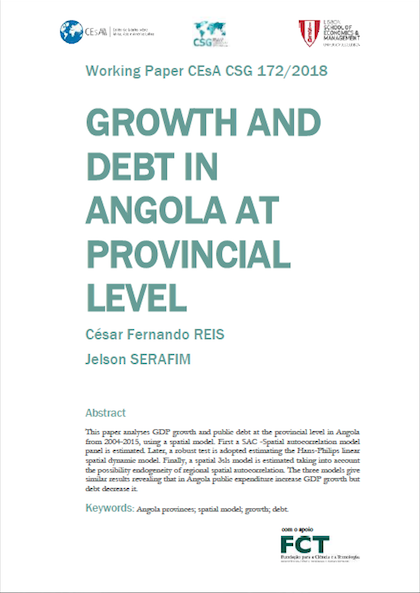
Working Paper 172/2018: Growth and Debt in Angola at Provincial Level
Abstract:
The relationship between growth and debt has attracted some research in past,(Eberhardt and Presbitero, 2015, Panizza and Presbitero, 2014, Kourtellos et al., 2013; Checherita-Westphal and Rother, 2012). This hypothesis has been tested for development countries and evidence from Africa countries restricted (Mistry, 1991; Ussain and Gunter, 2005; Mohamed, 2013; Owusu-Nantwi and Erickson, 2016). Reinhart and Rogoff (2010) find that growth rates fall in advanced and emerging market economies when the public debt-to-GDP ratio exceeds 90 percent and that high debt levels are correlated with higher inflation only in emerging markets. The Weak Government Hypothesis states that government fragmentation leads to higher public deficits and debt. This relation can be explained by government inaction, common pool problems or the strategic use of debt that arise in coalition governments (Ashworth, Geys and Heyndels, 2005). Therefore, this paper analyzes the relationship between debt and growth in Angola provinces from 2004-2015, using a spatial model. The spatial model is adequate in the present context as the focus are at regional level (Zhao, Tong and Qiao, 2002; chakravorty, 2003; Haddad, 2008; Barros, Faria and Araujo Jr., 2014) The SAC- Spatial autocorrelation model is adequate when the spatial autocorrelation is intense as it is in Angola context. The motivation for Growth and debt in Angola at provincial level is the following, first, growth at regional level is usually lower than at national level, revealing heterogeneity among Angola provinces that justifies the investigation between growth and debt. Second, regional public expenditure is taken into account since it is a component of the growth and debt. Third, regional public debt is not published in Angola and the access to it needs a ministry of finance accordance. This restricted access signifies that it is a political issue and therefore it may hide some political issues. Therefore, the use of it in and growth debt paper is curious. Additional, the Angola regional provinces are managed by MPLA- Movimento popular de Libertação de Angola members, the incumbent government, signifying that there is a centrality of power that increases the regional spatial correlation. This paper analyses GDP growth and public debt at the provincial level in Angola from 2004-2015, using a spatial model. First a SAC -Spatial autocorrelation model panel is estimated. Later, a robust test is adopted estimating the Hans-Philips linear spatial dynamic model. Finally, a spatial 3sls model is estimated taking into account the possibility endogeneity of regional spatial autocorrelation. The three models give similar results revealing that in Angola public expenditure increase GDP growth but debt decrease it.
Quotation:
Reis, César Fernando e Jelson Serafim (2018). “Growth and debt in Angola at provincial level”. Instituto Superior de Economia e Gestão – CEsA/ CSG –Documentos de Trabalho nº 172/2018.
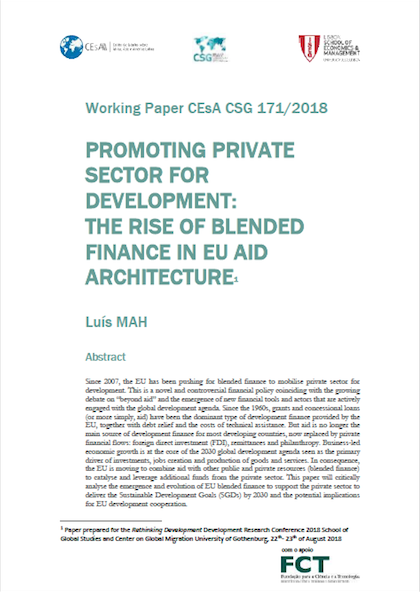
Working Paper 171/2018: Promoting Private Sector for Development: The rise of blended finance in EU aid architecture
Abstract:
Since 2007, the EU has been pushing for blended finance to mobilise private sector for development. This is a novel and controversial financial policy coinciding with the growing debate on “beyond aid” and the emergence of new financial tools and actors that are actively engaged with the global development agenda. Since the 1960s, grants and concessional loans (or more simply, aid) have been the dominant type of development finance provided by the EU, together with debt relief and the costs of technical assistance. But aid is no longer the main source of development finance for most developing countries, now replaced by private financial flows: foreign direct investment (FDI), remittances and philanthropy. Business-led economic growth is at the core of the 2030 global development agenda seen as the primary driver of investments, jobs creation and production of goods and services. In consequence, the EU is moving to combine aid with other public and private resources (blended finance) to catalyse and leverage additional funds from the private sector. Promoting private sector for development: the rise of blended finance in EU aid architecture will critically analyse the emergence and evolution of EU blended finance to support the private sector to deliver the Sustainable Development Goals (SGDs) by 2030 and the potential implications for EU development cooperation.
Quotation:
Mah, Luís (2018). “Promoting private sector for development : the rise of blended finance in EU aid architecture”. Instituto Superior de Economia e Gestão – CEsA /CSG – Documentos de Trabalho nº 171/2018.
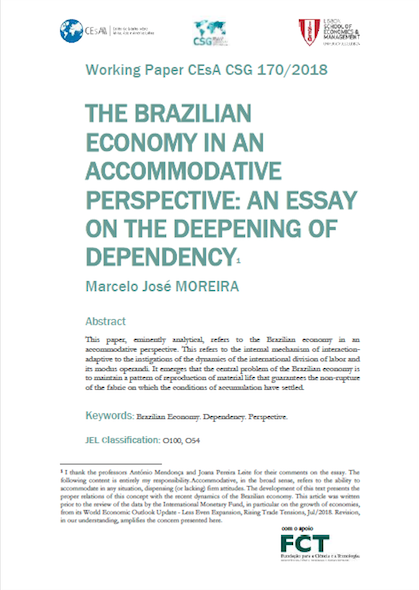
Working Paper 170/2018: The Brazilian Economy in an Accommodative Perspective: An essay on the deepening of dependency
Abstract:
This article, eminently analytical, refers to the brazilian economy in an accommodative perspective. This refers to the internal mechanism of interactionadaptive to the instigations of the dynamics of the international division of labor and its modus operandi. It emerges that the central problem of the Brazilian economy is to maintain a pattern of reproduction of material life that guarantees the non-rupture of the fabric on which the conditions of accumulation have settled. This document aims to propose a way of analyzing the Brazilian economy and its relationship with the recent dynamic of the global economy. In order to do so, one takes into account its dependence trajectory with this dynamics and proposes to analyze it in a perspective of non-structural alteration of the components that support it and, as a hypothesis, of the way these components interact. The components, for the purposes of this essay, are: exports and imports of goods (here called the Decisive Activity), reproduction of the labor force (here considered, as a proxy, for the joint analysis of the unemployment rate and average real income in minimum wages) and the investment rate (as a percentage of GDP).
Quotation:
Moreira, Marcelo José (2018). “The Brazilian Economy in an Accommodative Perspective: An essay on the deepening of dependency”. Instituto Superior de Economia e Gestão – CEsA /CSG – Documentos de Trabalho nº 170/2018.
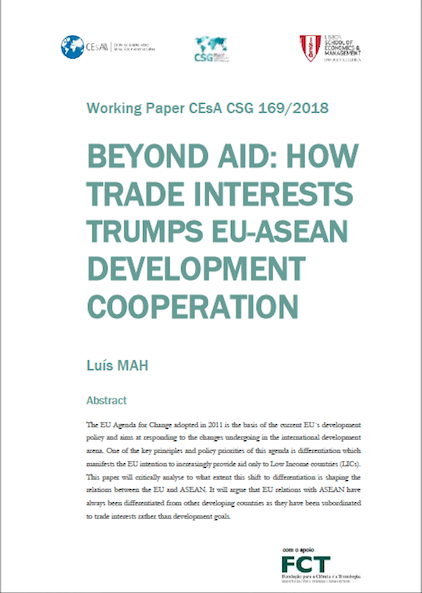
Working Paper 169/2018: Beyond Aid: How trade interests Trumps EU-ASEAN development cooperation
Abstract:
The emergence of new state donors from Latin America, Middle East and Asia as key development partners offering alternative models of development cooperation has had a significant impact on the workings of the international development cooperation arena (Hackenesch & Janus, 2013). The main distinction between the traditional and emerging donors has been the fact that, unlike the former, the latter present themselves as interested parties in what is described to be a mutually beneficial relationship with their development partner countries. In general, these emerging donors have been less eager to respect the dominant OECD-DAC normative discourse on quantity and quality of aid to focus more on mutual economic gains from the relationship. In exchange for aid from these emerging donors, beneficiary countries have been less constrained by political conditionalities and less subjected to scrutiny or oversight on macroeconomic policies. The EU Agenda for Change adopted in 2011 is the basis of the current EU´s development policy and aims at responding to the changes undergoing in the international development arena. One of the key principles and policy priorities of this agenda is differentiation which manifests the EU intention to increasingly provide aid only to Low Income countries (LICs). Beyond Aid: How trade interests Trumps EU-ASEAN development cooperation will critically analyse to what extent this shift to differentiation is shaping the relations between the EU and ASEAN. It will argue that EU relations with ASEAN have always been differentiated from other developing countries as they have been subordinated to trade interests rather than development goals.
Quotation:
Mah, Luís (2018). “Beyond Aid: How trade interests Trumps EU-ASEAN development cooperation”. Instituto Superior de Economia e Gestão – CEsA/ CSG – Documentos de Trabalho nº 169/2018.
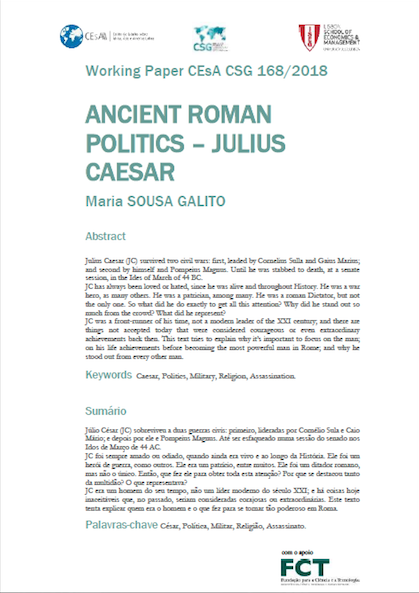
Working Paper 168/2018: Ancient Roman Politics – Julius Caesar
Abstract:
Ancient Roman Politics – Julius Caesar revisits Julius Caesar, one of the most famous conquerors of all time. Many books have been written about him, but not in a neutral way. The texts are usually attached to a political ideology. But reducing his persona to dictatorship can blind people to what he represented to his fellow Romans and who he really was as a man. Julius Caesar survived two civil wars: first led by Cornelius Sula and Gaius Mario; and then by him and Pompey Magnus. Until he was stabbed in a senate session in the Ides of March 44 BC. Julius Caesar was always loved or hated, when he was still alive and throughout history. He was a war hero, like others. He was a patrician, among many. He was a Roman dictator, but not the only one. So what did he do to get all this attention? Why did he stand out so much from the crowd? What did he represent? Julius Caesar was a man of his time, not a modern leader of the 21st century; and there are things unacceptable today that in the past would have been considered courageous or extraordinary. This text tries to explain who the man was and what he did to become so powerful in Rome.
Quotation:
Galito, Maria Sousa (2018). “Ancient Roman Politics – Julius Caesar”. Instituto Superior de Economia e Gestão – CEsA/CSG – Documentos de Trabalho nº 168/2018
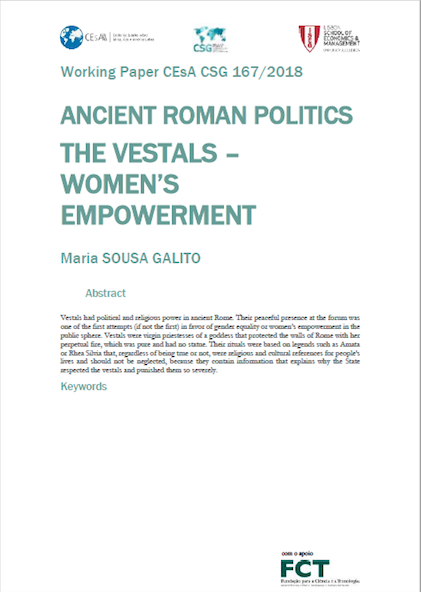
Working Paper 167/2018: Ancient Roman Politics the Vestals – Women’s empowerment
Resumo:
Ancient Roman Politics the Vestals – Women’s empowerment is about vestal virgins of ancient Rome. First chapter concerns goddess Vesta, her legends and what she represented. Second chapter is about who Vesta and why her priestesses were important to roman religion. Third chapter explains where they lived. Four chapter lists names of known vestals until Emperor Tiberius (a larger list is included in Appendix 2) and discusses situations involving their deaths or role model. Vestals had political and religious power in ancient Rome. Their peaceful presence at the forum was one of the first attempts (if not the first) in favor of gender equality or women’s empowerment in the public sphere. Vestals were virgin priestesses of a goddess that protected the walls of Rome with her perpetual fire, which was pure and had no statue. Their rituals were based on legends such as Amata or Rhea Silvia that, regardless of being true or not, were religious and cultural references for people’s lives and should not be neglected, because they contain information that explains why the State respected the vestals and punished them so severely.
Citação:
Galito, Maria Sousa (2018). “Ancient roman politics the vestals – women’s empowerment”. Instituto Superior de Economia e Gestão – CEsA/ CSG Documentos de Trabalho nº 167/2018.
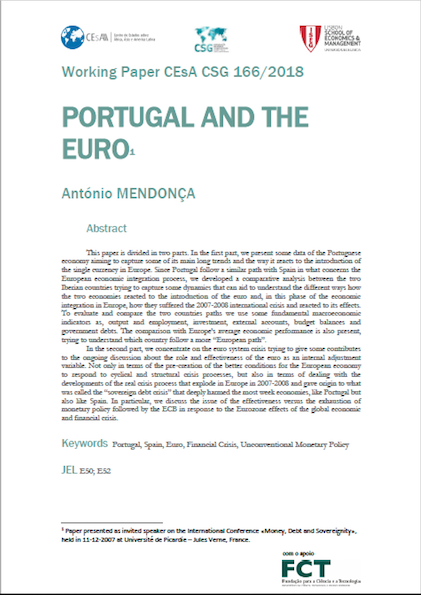
Working Paper 166/2018: Portugal and the Euro
Abstract:
Portugal and the Euro is divided in two parts. In the first part, we present some data of the Portuguese economy aiming to capture some of its main long trends and the way it reacts to the introduction of the single currency in Europe. Since Portugal follow a similar path with Spain in what concerns the European economic integration process, we developed a comparative analysis between the two Iberian countries trying to capture some dynamics that can aid to understand the different ways how the two economies reacted to the introduction of the euro and, in this phase of the economic integration in Europe, how they suffered the 2007-2008 international crisis and reacted to its effects. To evaluate and compare the two countries paths we use some fundamental macroeconomic indicators as, output and employment, investment, external accounts, budget balances and government debts. The comparison with Europe’s average economic performance is also present, trying to understand which country follow a more “European path”. In the second part, we concentrate on the euro system crisis trying to give some contributes to the ongoing discussion about the role and effectiveness of the euro as an internal adjustment variable. Not only in terms of the pre-creation of the better conditions for the European economy to respond to cyclical and structural crisis processes, but also in terms of dealing with the developments of the real crisis process that explode in Europe in 2007-2008 and gave origin to what was called the “sovereign debt crisis” that deeply harmed the most week economies, like Portugal but also like Spain. In particular, we discuss the issue of the effectiveness versus the exhaustion of monetary policy followed by the ECB in response to the Eurozone effects of the global economic and financial crisis.
Quotation:
Mendonça, António (2018). “Portugal and the Euro”. Instituto Superior de Economia e Gestão – CEsA/ CSG – Documentos de Trabalho nº 166/2018.
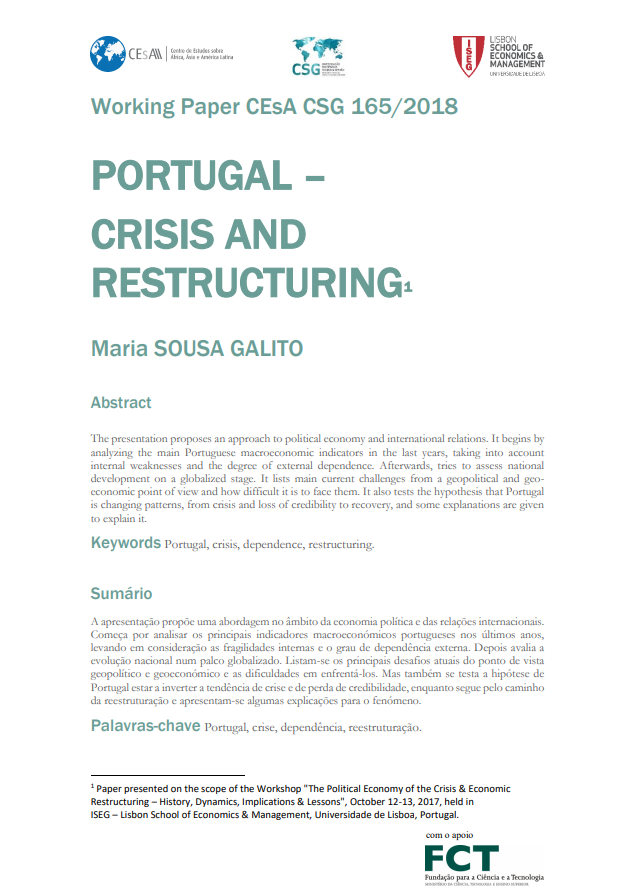
Working Paper 165/2018: Portugal: crisis and restructuring
Abstract:
Portugal is a southwestern country with a strategic triangle including two archipelagos and a territorial slice of the Iberian Peninsula. It’s a State-member of the European Union (EU) since 1986. After 2008 faced financial and economic restrain and asked for financial external help from Troika (IMF, European Commission and European Central Bank) between 2011/14. Taking that in mind, Portugal: crisis and restructuring contextualizes Portugal’s present situation and its trends for the last ten or less years. The first chapter analysis main macroeconomic indicators of Portugal, including the GDP, imports and exports specific performance, consumer price index, net lending/ borrowing by institutional sector, and sovereign ratings from the biggest international agencies. The second chapter evaluates some of the country’s inner fragilities, such as lack of industrialization and unbalanced GVA and Employment between major sectors (agriculture, services and industry), Risk of Poverty, Unemployment Rates and major demographic trends. The third chapter focus on external dependence; studies indicators in percentage of the GDP, like the Liquid External Debt, Emigrants’ Remittances, Public Transferences from and for the EU, but also the Geographical Distribution of Exports and Imports of Goods by Regions and by countries, and of Foreign Direct Investment (FDI) by Countries. The fourth chapter examines the overseas AICEP network, the Global Peace Index, The Travel & Tourism Competitiveness Index and Portuguese indicators like the revenue and number of bed nights by country of origin. A final chapter has a summarized critical assessment about the hypothesis of the EU becoming a federation and Portugal’s part in it. The presentation proposes an approach to political economy and international relations. It begins by analyzing the main Portuguese macroeconomic indicators in the last years, taking into account internal weaknesses and the degree of external dependence. Afterwards, tries to assess national development on a globalized stage. It lists main current challenges from a geopolitical and geo-economic point of view and how difficult it is to face them. It also tests the hypothesis that Portugal is changing patterns, from crisis and loss of credibility to recovery, and some explanations are given to explain it.
Quotation:
Galito, Maria Sousa (2018). “Portugal: crisis and restructuring”. Instituto Superior de Economia e Gestão – CEsA/ CSG – Documentos de Trabalho nº 165/2018.
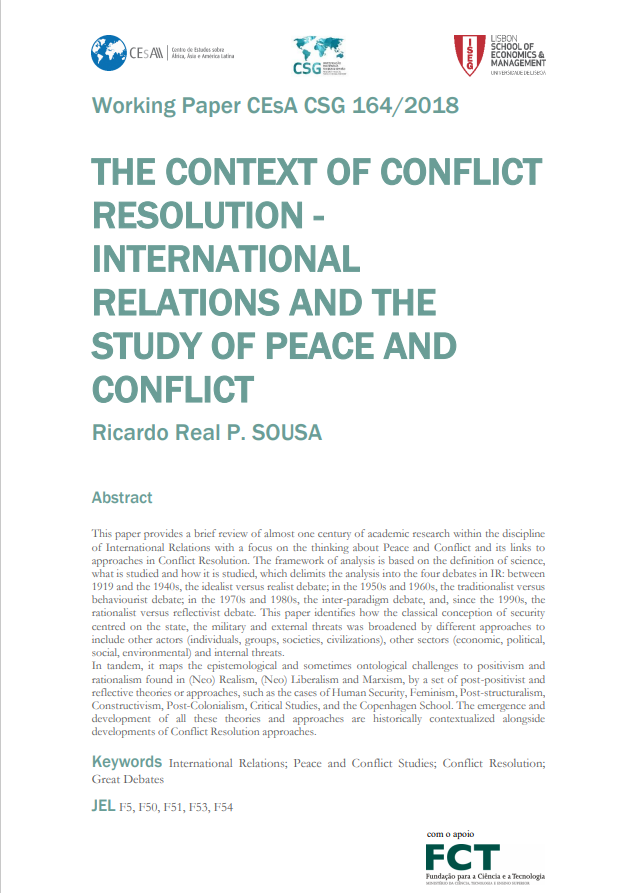
Working Paper 164/2018: The Context of Conflict Resolution: International relations and the study of peace and conflict
Abstract:
The Context of Conflict Resolution: International relations and the study of peace and conflict provides a brief review of almost one century of academic research within the discipline of International Relations with a focus on the thinking about Peace and Conflict and its links to approaches in Conflict Resolution. The framework of analysis is based on the definition of science, what is studied and how it is studied, which delimits the analysis into the four debates in IR: between 1919 and the 1940s, the idealist versus realist debate; in the 1950s and 1960s, the traditionalist versus behaviourist debate; in the 1970s and 1980s, the inter-paradigm debate, and, since the 1990s, the rationalist versus reflectivist debate. This paper identifies how the classical conception of security centred on the state, the military and external threats was broadened by different approaches to include other actors (individuals, groups, societies, civilizations), other sectors (economic, political, social, environmental) and internal threats. In tandem, it maps the epistemological and sometimes ontological challenges to positivism and rationalism found in (Neo) Realism, (Neo) Liberalism and Marxism, by a set of post-positivist and reflective theories or approaches, such as the cases of Human Security, Feminism, Post-structuralism, Constructivism, Post-Colonialism, Critical Studies, and the Copenhagen School. The emergence and development of all these theories and approaches are historically contextualized alongside developments of Conflict Resolution approaches.
Quotation:
Sousa, Ricardo Real P. (2018). “The Context of Conflict Resolution: International relations and the study of peace and conflict”. Instituto Superior de Economia e Gestão – CEsA/ CSG Documentos de Trabalho nº 164/2018.





